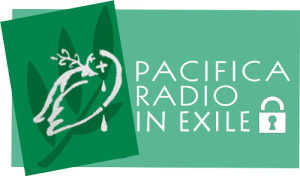Originally posted June 16, 2015
Los Angeles – Pacifica’s National Board held one of its increasingly rare in-person board meetings in Los Angeles this past weekend, as LA station KPFK, the most financially successful Pacifica station as recently as 2013, contines its rapid free fall into insolvency. In May, outgoing IED Margy Wilkinson saddled KPFK with a community college teacher as a new general manager, Leslie Radford, whose only credential appears to be a few years as a factional fighter on the local and national boards.
The meeting began on Friday with a bang, as PNB treasurer Brian Edwards-Tiekert falsely asserted Pacifica’s 2013 audited numbers of a $2.8 million deficit (helped along by the bizarre accrual of $658,000 in additional debt to Democracy Now when Pacifica’s contract with the program had expired before the year began), were “the biggest deficit in a decade”. They weren’t even the biggest deficit in the last five years, as Pacifica’s audited numbers are 2009 – $1.9 milion deficit , 2010 – $2.9 million deficit, 2011 – $643K deficit, 2012 – $1.0 million deficit, 2013 – $2.8 million deficit.

On Saturday, local issues at LA station KPFK took center stage. Many KPFK employees came to register their concerns about the managerial hire, expressed here by their selected representative Tony Bates. The public comment period (you can see brief comments from that session from long-time LA overnight host Roy of Hollywood and former IED Grace Aaron) was followed by a meeting disruption when the board majority attempted to argue with the audience and were shouted down and told to return to their agenda. They did. A few brief clips of the disruption were recorded here and here (when board chair Lydia Brazon hissed at board secretary Janet Kobren to “stop touching me”.
The meeting then moved on to several hours of discussion of a board mandate to increase the number of program broadcasts entirely in the Spanish language by 5 hours a week more than the current amount (which ranges from15 hours a week at KPFK to 0 hours a week at WPFW-DC). The motion from the board’s Spanish Language Task Force is a must-carry mandate for all five stations, indicates the programs must be broadcast weekdays between 6:00am and 8:00pm, describes the programming as “permanent” and advises that if stations cannot assemble their own local program collectives they should then consider picking up programs from the existing 15 hours at KPFK (or as also suggested, board member Robert Rabin’s full power station in Puerto Rico). Board member Rodrigo Argueta, who brought the motion, produces Voces de Libertad at KPFK and his wife produces Insurgencia Femina, two programs that recently came under fire from some segments of LA’s activist community. The motion passed the board overwhemingly. All 4 KPFA board members voted for it as did all KPFK board members and the entire DC delegation.

On Sunday, the board majority visibly split apart on several votes, including one that abolished on-air election information tutorials, which was voted down and then brought back up for reconsideration where it passed after modifying the length to five minutes and airing requirements to once in a month per program. Board members Argueta, Casenave, Norman and Tucker broke with Brazon, Wilkinson and Edwards-Tiekert and restored the on-air announcements. Similarly, a motion by KPFA board member Jose-Luis Fuentes to strip any supervisory authority by executive director John Proffitt over the organization’s chief financial officer was soundly defeated, with only Brazon and Medina from LA and Diaz and Brown from Washington DC supporting the idea of stripping the executive director from any financial operational supervision whatsoever.
It was also announced that Lydia Brazon’s employer, millionaire real estate investor Aris Anaganos, had given up on repayment of his $156,000 loan to Pacifica in August of 2014 and would no longer ask for the debt to be repaid after Pacifica missed the first four installment payments. Pacifica, despite claiming repayment was the top priority at the time of the loan, did not make a single payment on the loan for the last 9 months. Brazon came under fire at the time for not recusing herself from a vote to accept a large personal loan from her employer. Pacifica was facing potential legal problems for not using available funds that came in July of 2014 to pay overdue employment taxes.
Brazon’s role in a US government operation to free from prison Nicaraguan Contra operative and suspected CIA agent James Jordan Denby, described as a “prime Contra supplier” by the Chicago Tribune, is described in this 1988 LA Times article. Pacifica provided gavel to gavel coverage of the Iran-Contra hearings, but has never covered the involvement of their board president and long-time board member in the operation to free Denby.

The note pad found on the floor at the Pacifica National Board meeting in November of 2013 traveled to Los Angeles and the national board meeting. Former IED Margy Wilkinson could be seen pacing rather intently when the note pad was visible, but did not choose to reclaim the Esselte pad. The full contents have been scanned and they can be found here. (Scroll to the bottom of the page for a PDF download of the entire contents of the notebook). The note pad categorized all the members of the 2013 national board of directors under three labels: “US”, “THEM” and “WORKABLE”.
In the “US” category: Brian Edwards-Tiekert (KPFA), Wilkinson (KPFA), Dan Siegel (KPFA), Lydia Brazon (KPFK), Brenda Medina (KPFK) and Cerene Roberts (WBAI).
In the “THEM” category: Tracy Rosenberg (KPFA), Carolyn Birden (WBAI), Heather Gray (Affiliate), Teresa Allen (KPFT), Jessica Apollinar (KPFT), John Cromshow (KPFK), Richard Uzzell (KPFT) and Summer Reese (KPFK).
In the “WORKABLE” category are listed: Janet Coleman (WBAI), Janis Lane Ewart (Affiliate), Tony Norman (WPFW), Katea Stitt (WPFW), Luzette King (WPFW), Benito Diaz (WPFW), Nancy Hentschel (KPFT), and Manijeh Saba (WBAI).
One of Leslie Radford’s first actions as KPFK’s general manager was to return to station premises a former board colleague of hers, Ian Johnston, who was removed from the local board after attempting to make citizens arrests with handcuffs of staff and board members, both in the LA station’s lobby and then at a board meeting held at the People’s College of the Law, which asked the KPFK local board to never meet there again after the Johnston incident.
The lobby incident was recorded on a security camera and while the footage was embargoed for a long period of time, (attempts to arrange a viewing for the KPFK local station board at the time were shut down by Radford and others in her faction at the time of the incident), it is now available. The raw footage is 34:52 in length, and brief clips from before, during and after the incident are now on Youtube. You can view the 8 minutes of footage here. They include Johnston’s altercation with the receptionist prior to the confrontation, a confrontation with IT director Jonathan Alexander, and the aftermath with several female KPFK employees encountering Johnston in the lobby.
Johnston, who was at the entire June 2015 meeting, was handcuff-free at this meeting, but threatened several members of the audience, board and KPFK staff, including following some for more than half a block outside the meeting area and threatening to “serve” them or “get them”.
Pacifica in Exile readers may write to the board at pnb@pacifica.org.
To subscribe to this newsletter, visit www.unitedforcommunityradio.
###
Started in 1946 by conscientious objector Lew Hill, Pacifica’s storied history includes impounded program tapes for a 1954 on-air discussion of marijuana, broadcasting the Seymour Hersh revelations of the My Lai massacre, bombings by the Ku Klux Klan, going to jail rather than turning over the Patty Hearst tapes to the FBI, and Supreme Court cases including the 1984 decision that noncommercial broadcasters have the constitutional right to editorialize, and the Seven Dirty Words ruling following George Carlin’s incendiary performances on WBAI. Pacifica Foundation Radio operates noncommercial radio stations in New York, Washington, Houston, Los Angeles, and the San Francisco Bay Area, and syndicates content to over 180 affiliates. It invented listener-supported radio.


